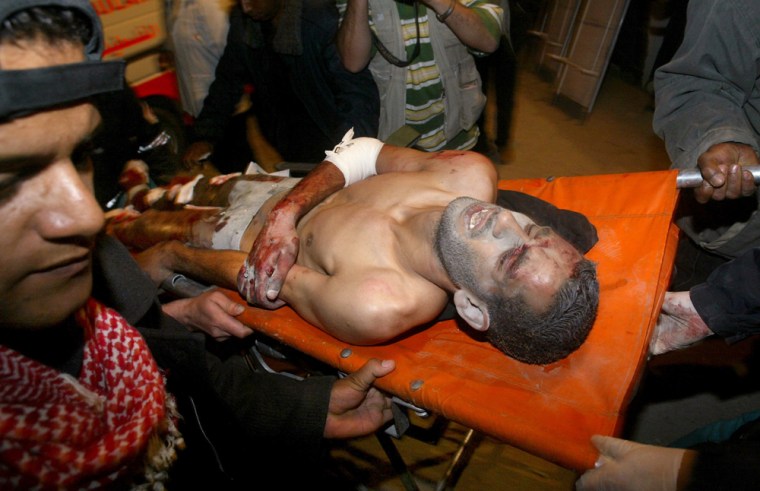Israeli helicopters pounded this refugee camp with missiles and machine gun fire Tuesday, killing 12 Palestinians, at least seven of them reportedly armed, as troops searched houses in the largest Israeli offensive in Gaza in years.
Trapped residents said they huddled in the innermost rooms of their homes as bullets rained outside. Others tried to flee to safer ground. At least 34 Palestinians were wounded, including eight who were in critical condition.
Israel says it is targeting the Rafah refugee camp, on the border with Egypt, to destroy arms-smuggling tunnels and hunt Palestinian militants. Security officials said earlier this week that the army also plans to widen an Israeli patrol road between the camp and Egypt, which would entail demolishing rows of nearby houses.
Last week, Israel destroyed about 100 houses near the patrol road, making more than 1,000 Palestinians homeless and drawing worldwide condemnation, including rare criticism from the United States.
The first phase of Israel’s offensive Tuesday focused on the Tel Sultan neighborhood of Rafah, about 1½ miles from the patrol road.
Two missile strikes
Bulldozers began tearing up a road to separate the neighborhood from the rest of the camp, home to about 90,000 Palestinians, witnesses said. Soldiers backed by about 45 armored vehicles went house-to-house in the neighborhood.
Resident Mohammed Shaer, 39, said soldiers locked him, his wife and five children in one room as they searched the building. He said he heard heavy firing outside, and that no one dared approach the windows.
Twelve Palestinians were killed by Israeli fire — 10 in two separate missile strikes, and two by machine gun fire. A 13th man was killed while handling explosives.
At least seven of the dead were armed, hospital officials said. Israel’s army chief, Lt. Gen. Moshe Yaalon, said nine of those killed were militants, who fired from assault rifles.
At the beginning of the raid, a missile fired from a helicopter hit a group of gunmen outside a mosque in Tel Sultan, killing three. Two more missiles were fired, killing three more people who rushed to help. The mosque caught fire.
In another air strike, four Palestinians were killed, all civilians, according to hospital officials. Doctors initially said two of the dead were militants, but said they erred in the identification because two of the bodies were badly mangled.
The military said both strikes were aimed at gunmen.
Morgue fills up
Troops demolished three houses in Tel Sultan, witnesses and the army said. In all, more than 11,000 Palestinians in Rafah have been made homeless by Israeli demolitions since the outbreak of Israeli-Paletinian fighting in 2000.
With the dead streaming to Abu Yousef Al Najar Hospital in Rafah, the morgue filled up and bodies were placed in a storefront next to a felafel stand.
Palestinian ambulance drivers reported coming under fire, and Dr. Moawiya Hassanain, a Palestinian Health Ministry official, said several ambulances were pinned down in the area of fighting, unable to evacuate wounded to the hospital.
The Israeli military denied the claims. Maj. Sharon Feingold said the military had sent 40 oxygen tanks to Rafah hospital and was keeping the access road open.
Hassanain said the Rafah hospital was not equipped to treat seriously wounded patients. However, troops sealed off Rafah on Monday, and the road to a larger hospital in neighboring Khan Younis — and the rest of the Gaza Strip — was closed. The army said it was permitting some ambulances to drive to Khan Younis.
Over the weekend, thousands of Rafah residents had fled the camp, in expectation of a major Israeli offensive. The United Nations Relief and Works Agency (UNRWA) prepared emergency shelter in schools and pitched a tent camp.
Several days long
Yaalon, the Israeli army chief, said Tuesday that the aim of the operation is to destroy arms-smuggling tunnels. He said homes would only be demolished if gunmen used them as firing positions or to cover up tunnels. However, earlier this week, Yaalon was quoted as telling the Israeli Cabinet that hundreds of houses were marked for demolition, if weapons smuggling and violence in Rafah persisted.
Yaalon suggested the offensive could continue for several days.
He said Israel has no choice but to act, because Palestinian militants have succeeded in smuggling rocket-propelled grenade launchers into Rafah, with the help of Iran and the Iranian-funded Hezbollah guerrilla group in Lebanon.
“They find that the Egyptian border is easy to get through and they are bringing in these weapons,” Yaalon said.
Arab nations asked for a special session of the U.N. Security Council, and U.N. Secretary-General Kofi Annan denounced the Israeli operation. “I appeal to the Israeli government to stop this destruction, which is against international humanitarian law,” he said.
Palestinian Foreign Minister Nabil Shaath pleaded with U.S. National Security Adviser Condoleezza Rice during a meeting in Berlin on Monday to stop the Israeli offensive. Shaath told Rice he has received calls from fearful relatives in Rafah.
“She (Rice) said that she and President Bush will act to stop what is going on in Rafah,” Shaath said. Israel Radio reported early Tuesday that the U.S. government was seeking clarifications from the Israelis about their plans in Rafah.
Deputy Defense Minister Zeev Boim said civilian hardships are unintentional but unavoidable. Some of the people in Rafah “rent their houses for digging tunnels, so not all of the people there are blameless.”
